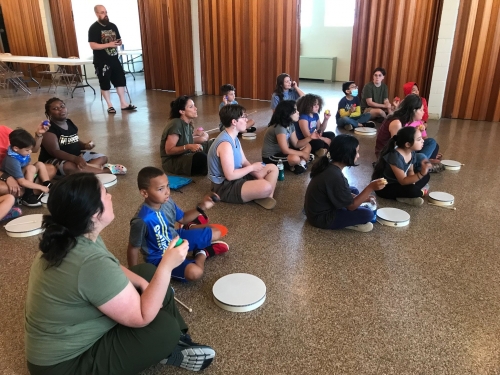One Church’s Education Vision: Supporting Families Through the Pandemic…and Beyond
Persistent Problems, Promising Potential
When COVID hit, many parents around the country were left in a tough spot. Schools were closed and online learning wasn’t working for every child — or every family. At the same time, churches and other community organizations were finding that their traditional outreach programs couldn’t go forward. With social distancing and travel restrictions, they simply weren’t able to serve communities in the same ways they had done in the past.
This meant that there was untapped energy and initiative in these churches, waiting to be redirected towards growing educational needs. While the legislative wheels to increase educational opportunity for students turn slowly in Columbia, one faith community was immediately able to step into the breach.
When Peter Hubbard, longtime Teaching Pastor at North Hills Church (NHC) in Greenville, preached a sermon challenging his NHC congregants to pray about how the Lord could use COVID challenges in their lives to “Come Out Stronger,” little did he know the power of the vision about to be unleashed.
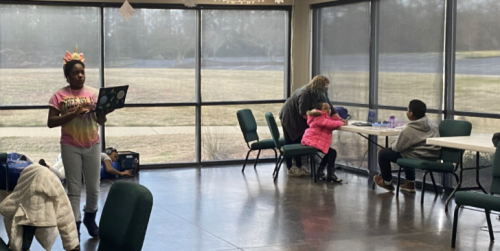
As it turns out, God had been uniquely equipping North Hills Church to rise to the challenge and answer this moment of great education need for low-income students across the Greenville community for years.
Over two decades early, NHC started a summer sports camp for elementary kids in their neighborhood. They quickly saw that the children they served had academic struggles that needed to be addressed, not just a safe place to spend their summers. So they added an academic element of intensive tutoring in reading and basic math in the morning, followed by an afternoon of fun.
In fact, teachers and administrators at Brook Glenn Elementary now nominate the students they believe will benefit most from participation in the camp, and North Hills and their teachers closely collaborate to help them succeed.
Counselor Maggie Moellman is quick to share that the church is a true partner for her school: “When we need things, I call North Hills. They do amazing things…basically, anything we ask for, we get.”
With over a decade of experience under their belt, this program has taken students who were two to three grades behind in English and Math skills and help them not just catch up but to thrive, with many students going on to earn As and Bs. NHC now even has students who might otherwise have dropped out that have now graduated from high school, thanks to the brighter path the summer camps helped them blaze.
So when COVID flipped schools to remote learning overnight, North Hills sprang into action, taking their summer camp know-how to establish “learning pods” for children they would have normally served in their neighborhood.
In these learning pods, students were able to continue in their traditional school through virtual instruction, but with the help and guidance of loving, present adults. This was a Godsend for parents who couldn’t work remotely and had to go to work to keep the bills paid, whether they had childcare help or not.
After getting two learning pods up and running at North Hills, the organizers realized that the community-wide need was far greater than their current capacity — they mobilized to replicate this with other faith partners in low-income areas of Greenville. They collaborated from the ground up with people in those communities and ended up with 10 learning pods across Greenville.
“Churches have so much to offer — land, and tons of people that want to make a difference.” Allan Sherer, the NHC pastor leading their education vision shared. “The essential components of poverty… it’s fundamentally about housing, economic opportunity, and transportation. The problems compound themselves but so do the solutions! One changed life can have a major impact in a community. Instead of treating symptoms, we’re building capacity,” he explained.
The pod structure addresses a major challenge in schools — the need for students to have more individual attention. Tori Bennett, an NCH pod teacher, said that she appreciates pods for “getting to see the students for who they are as individuals. Not just, ‘What’s the deliverable?’, but ‘how can we help this child succeed in the long-term?’ The smaller classes help. You get to really know who they are.”
“This has been the most beautiful thing to come out of COVID. They will come out stronger. Leaps and bounds. They will go in with more confidence. They get to go bring that back to the communities. This is my favorite job I’ve ever had. I would do this forever.” – Tori Bennett, NHC pod teacher
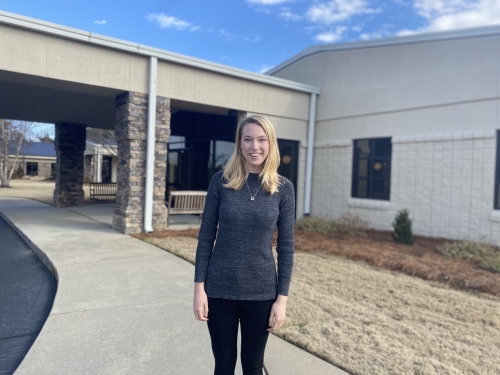
The Power of Hope
“What choices do you have to look to for hope? The secret sauce is the partnership.”- Alan Sherer, NHC pastor
Sherer shares that hope is key to the success of these pods. “Whoever provides the greatest hope is going to have the greatest influence. If you have no hope, you will not try,” he explained. Far from being some pie-in-the-sky aspiration, the “hope” he references has meant tangible results in real lives.
It’s also clear that love is the “secret ingredient” that opens the door to learning for these children. Miriam Burgess, a long-time child and community advocate describes one of her students whose story exemplifies this powerful combination of hope and love:
“When (Xavier) came to our pod, he was a middle schooler. His grades were 17’s, 24’s, very low. No desire to even do schoolwork,” Burgess said. “Once he got used to us, and we showed him it’s okay to do well in school: within a week or so, his whole demeanor changed. He saw his grades shoot up. He began to enjoy school because he saw what he could do. He had been involved in gang activity and he wanted to get out, because being around us, he saw the need to be a better person for his family. He turned into a different child.” – Miriam Burgess, Bell Meade pod leader
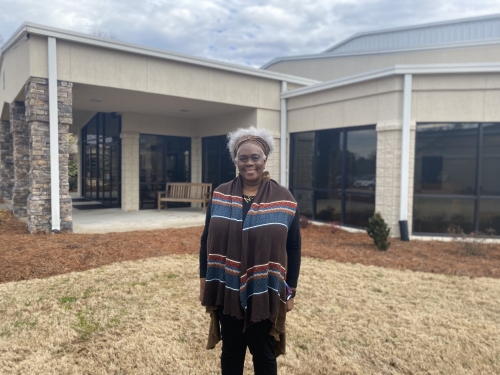
A Big Vision for the Future
But the story hasn’t ended with students’ return to their classroom.
NHC’s learning pod experience has blossomed into a vision to establish a network of world-class private schools to impoverished students across South Carolina, starting in the Judson Mill community. Located in the former mill hill that is one of Greenville’s poorest neighborhoods, and based out of the historic Greater Mt. Calvary Baptist Church, the Judson School plans to open its door in the fall of 2022.
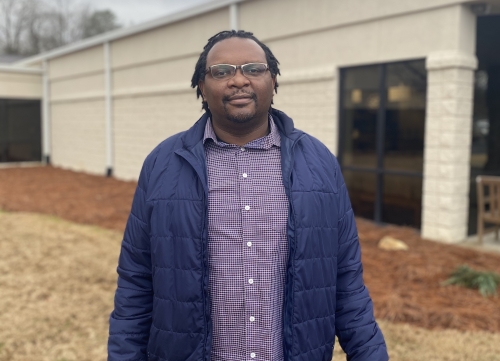
“Let’s grow these pods and make sure kids have a place to go. There’s going to be a big academic gap if we don’t step up and support these kids.” – Marquis Flemings, Judson Mill pod leader at Long Branch Baptist Church
With such diversity and so many different voices working together on these schools, they are uniquely set up for success. There are the local organizations who know the communities, schools who know the challenges their students face, and parents who know their children better than anyone.
Providing the very best world-class education at an affordable level for these students requires significant investment, and much like this historic Rosenwald schools, generous businesses and philanthropists have stepped up to fund the majority of the start-up costs to launch this endeavor.
Partnering with private philanthropists who are able to bring the vision to reality and organizations like Palmetto Promise Institute who can help navigate the policy involved and bring the stories to a wider audience, there is every reason to believe that this will be an incredible rebirth of hope for struggling students and their larger community.
Uniting for the Work Ahead
Sustaining and growing the vision overtime will require new resources, strong partnerships, and broad participation.
It will take all of us working together if every child in South Carolina is to have access to the educational opportunities that will help them thrive. PPI shares stories like these to inspire others to take action:
- Faith communities across South Carolina must answer the call to reengage in their historic role in education. This work can take many different forms, whether a summer camp or pod, a faith-based school or micro-school, supporting a homeschool co-op, or strategically engaging a local public school to provide tutors and mentors to students. The possibilities for education partnership are unlimited and NHC has proven that low-cost, high-impact initiatives can change the trajectory of children’s lives and give communities new hope.As Maurice Fleming shared, “It will take the community. Public schools are overwhelmed. There’s a lot going on in that space. It’s now the job for the community to step up and take the pressure off.”
- Legislators can look beyond traditional educational models to create an environment in which educational entrepreneurship such as The Judson School can flourish. In 2022, South Carolina lawmakers have a golden moment of opportunity to remove barriers between students and the education they need is by supporting Education Savings Accounts (ESAs), which gives parents flexible, accountable control over a portion of their child’s state educational funding, allowing them to support their child’s learning in many different environments.While the details of legislation aren’t always the most exciting – improving lives is. Following the bold example of educationally thriving states like Florida, expanding education freedom is the most important thing lawmakers can do for South Carolina students in 2022.
Palmetto Promise’s work has been directed and energized by passionate education entrepreneurs, parents, and everyday citizens we have met across South Carolina. These leaders are rising up to make a difference for children in every corner of our state and we’re excited to stand with them to advance education hope and equal opportunity in the days ahead.
